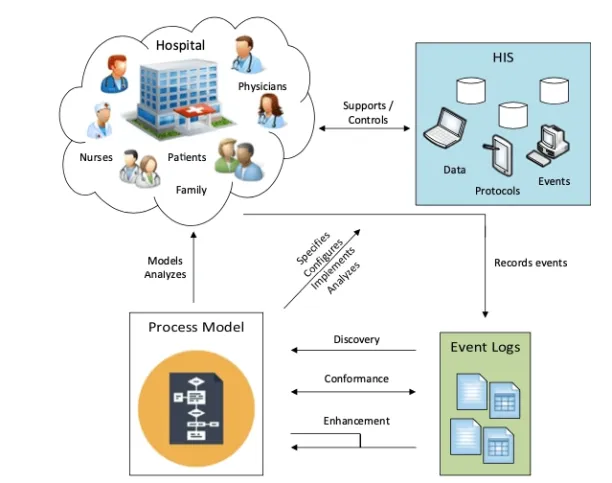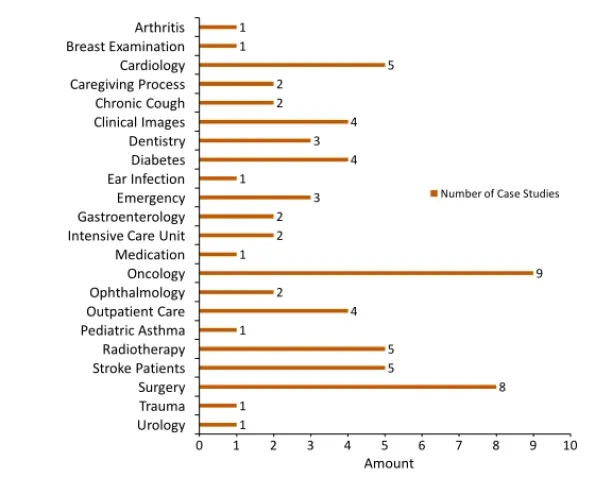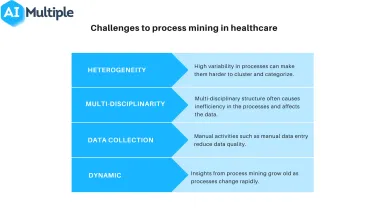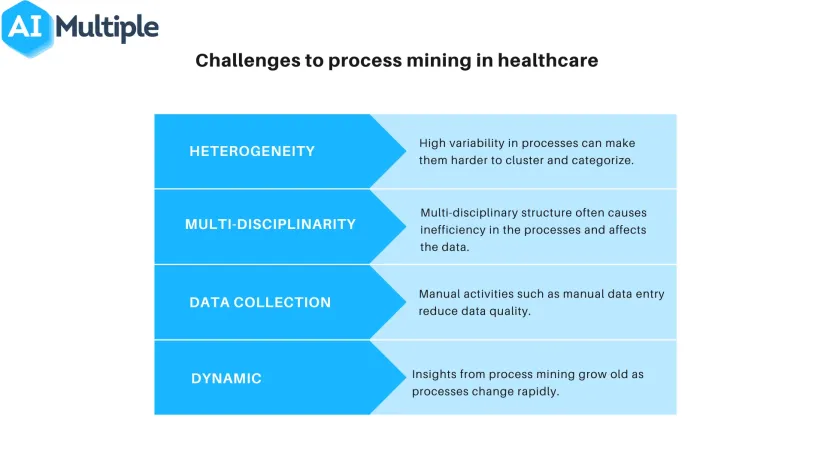The digitalization of healthcare is crucial to improve patient care and allocate the necessary resources properly. As healthcare is more digitalized, more process data is being generated which can be mined for insights. Over the last few years, healthcare has become one of the fields where researchers actively discuss process mining applications. 1
In this article, we explain how process mining is employed in healthcare together with benefits and best practices.
What is process mining in healthcare?
Process mining in healthcare is the application of process mining technology to clinical processes. It determines where and how to implement a quality improvement strategy that corresponds to the healthcare needs.
Healthcare processes include diagnosis, treatment and disease prevention with the aim of enhancing patients’ health. Process mining enables healthcare professionals to understand and analyze these processes in order to optimize the overall process efficiency.
What are the benefits of process mining in healthcare?
Process mining responds to the problems of rising costs, population aging and increasing demand for healthcare. 2 Process mining technology provides insights about processes and patient behavior and help to drive efficiency by:
- Identifying and understanding the real behavior of resources and the patients.
- Predicting the patient behavior through previous cases.
- Improving resource management
- Analyzing process performance
- Increasing capabilities to meet the increasing demand
- Providing insights to develop the collaboration across units and peers.
- Suggesting to redesign the process.
- Reducing the waiting and service time
- Reducing the cost of services
- Increasing process transparency
- Detecting the bottlenecks in the process.
- Including additional information into the activities.
- Identifying decision patterns that are applied rules in different cases.
Furthermore, the pandemic has emphasized the cruciality of improving healthcare processes across the globe. There is a growing interest in data collection and interpreting the data properly.3 Process mining corresponds to the interest by analyzing the data with a priority on processes.
ZhiQian Huang, co-founder @ Logan Tod & Co and process mining community lead at AnalystX, deployed process mining across 3 NHS Trusts, an ICS and a voluntary sector network. Process mining benefit in the following areas:
- Resource allocation
- Service management
- Care & support coordination
- Identify potential health inequalities
She focused on consolidating event timestamps across multiple datasets to enable the visualization of a person’s journey through the NHS and voluntary sector. As health and community organizations switch to fully digital processes, she believes that process mining can be helpful to
- Interrogate complex clinical pathways
- identify variations for each individual to prevent health inequalities and poor quality experiences
- Provide real- time coordination of support for patients and residents with complex needs
Clinical pathways are similar to customer journey pathways, showing each step a patient goes through to receive treatment. These pathways can be found in clinical guidelines and practices. Process mining can visualize these pathways for each patient and identify the level of variations. By doing so, it can help provide real necessities for patients.
How is process mining used in healthcare?

Process mining is used in healthcare for the analysis of Hospital Information Systems (HIS) and other IT systems (EHR, ERP, LIMS, etc) as Figure 1 illustrates. These systems store data for all interactions among units helping patients.
Process mining extracts process knowledge from event logs from mentioned systems. In many cases, it requires systems storing diagnostic tests and treatments or laboratory systems with all tests performed on a blood sample.
Process mining event logs contain all the data about the patient, healthcare process, and steps taken in each process, as well as involved personnel and costs of the processes, in order to reflect an objective view on how processes are executed.
What are the case studies of using process mining in healthcare?
73% of healthcare process mining case studies in a comprehensive literature review from 2016 were concentrated in Europe.4 There are also examples in Australia, Asia and North America. Specifically, in Europe, The Netherlands is the country with the largest amount of case studies, followed by Germany and Belgium.
Netherlands’ lead is not surprising since process mining concept was originated there. In one of these examples in the Netherlands, a general hospital could diminish patients’ time in hospital at 50%. 5
Prom, an open source, is the tool that was the most commonly utilized in the cases. Since this paper was published, other process mining vendors grew significantly and account for a large share of the market.
Through the case studies, authors present a table with the amount of process mining applications in each healthcare field. As you can see in Figure 2, the oncology and surgery are the leading areas for process mining.

Challenges to process mining in healthcare
Based on expert interviews including ZhiQian as well as our analysis of case studies, we see these as the reasons behind low levels of adoptions for process mining in healthcare:
Data related issues
- Data maturity / collection issues: In private sectors, processes are designed as workflows and they are stored in IT systems as log data with clear time stamps. This is not often the case for healthcare organizations. There are electronic records for patients but not set out to record individual activity as an event with a timestamp hence significant amounts of data prep and expertise may be required. Data can come from a variety of sources including individual spreadsheets which need to be linked to a pathway or referral before process mining analytics can be applied.
- Data privacy issue: To provide useful actionable insights, organizations need to identify the specific patient and/or resident or the cohort of patients. Teams require additional approvals to use any individual identifiable datasets.
- Data interrogation issues: Healthcare and community organizations are not routinely trained to conduct data interrogation to identify actionable insights. The analytics capabilities within healthcare and community providers are regularly understaffed and have limited opportunities to invest in testing and implementing new tools and techniques.
Other issues
- Heterogeneity: Despite the standard processes, every patient is a unique individual. Many times, treatment of the same diseases changes for each patient. This heterogeneity is challenging for process mining since it requires similarity among processes to generalize them.
- Multidisciplinarity: In the field of medicine, each department is extremely specialized. Yet, these departments need to collaborate for many operations and diseases. This multi-disciplinary structure often causes inefficiency in the processes and affects the data as well.
- Changing fast: Medical knowledge and required technology continue to evolve. That fast change generates difficulty for processes and process mining accordingly.
Most of these challenges also serve as opportunities for process mining to improve. While implementing process mining properly, hospitals will be engaged in more automation, more efficient collaboration and hospital systems that change fast as well.
Technology providers
There are numerous companies providing process mining for multiple sectors. The extent of the solutions provided by the companies varies. Therefore, it is useful to engage in conversations and research to find the solutions fitting to your necessities. Before you start to talk to vendors, use our data-driven process mining vendor list to identify a short list of tools and save time.
Further Reading
Discover real-world applications of process mining in different business domains and technologies:
- Process Mining in Education: Use cases, Benefits & Challenges
- The Ultimate Guide to Process Mining in SAP
- The Complete Guide to Process Mining and Digital Twins
If you believe you need guidance to apply process-mining in healthcare, let us help you to find the right vendor:
External Links
- 1. Process Mining For Dummies, Celonis Special 2nd Edition | Celonis.
- 2. Process Mining in Healthcare: Evaluating and Exploiting Operational ... - Ronny S. Mans, Wil M. P. van der Aalst, Rob J. B. Vanwersch - Google Kitaplar.
- 3. Process Mining in Healthcare: Evaluating and Exploiting Operational ... - Ronny S. Mans, Wil M. P. van der Aalst, Rob J. B. Vanwersch - Google Kitaplar.
- 4. ScienceDirect.
- 5. How process mining in healthcare can save lives. Process Excellence Network



Comments
Your email address will not be published. All fields are required.